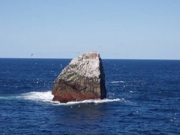
The 26-County of Foreign Affairs has said a British bid to claim jurisdiction to the distant Irish island of Rockall is a “stunt”.
Englishman Andy Strangeway is behind the idea of installing the plaque on the island as a means of claiming the valuable exploration and fishing rights on the surrounding Rockall Bank and Trough, and the Rockall Plateau.
The volcanic rock is 100ft wide and 70ft high and a 267 miles off the north-west of Donegal, the nearest mainland.
Britain, Iceland, and Denmark have all disputed Ireland’s claim to the marine rights. The competing claims are to be evaluated in 2014 by a commission set up under the United Nations Convention on the Law of the Sea.
A “consent” to install the plaque, reportedly issued by a Scottish local council, was touted by Strangeway as the first-ever planning permission for Rockall.
Strangeway said: “I am determined to create British history, but more importantly to re-establish the UK’s symbolic claim to Rockall by re-erecting Her Majesty Queen Elizabeth II’s plaque where it rightly belongs.”
The island was previously claimed by Britain in 1955 to “stop the Soviet spying on missile tests”, and a plaque and Union Jack were placed on the island.
In 1985 Tom McClean, an SAS and Parachute Regiment veteran, spent 40 nights on the volcanic rock in a subsequent attempt claim to it.
It has also been claimed by Greenpeace, who in 1997 landed on the island, stayed for 42 days, replaced a navigational beacon with a solar-powered one and declared Rockall the sovereign territory of “Waveland” in protest at oil and gas exploration.
“Stunts such as these do not undermine the fact that there is no dispute between Ireland and Britain over Rockall,” a spokesman for Minister for Foreign Affairs Micheal Martin said.
![[Irish Republican News]](https://republican-news.org/graphics/title_gifs/rn.gif)
![[Irish Republican News]](https://republican-news.org/graphics/title_gifs/harp.gif)

